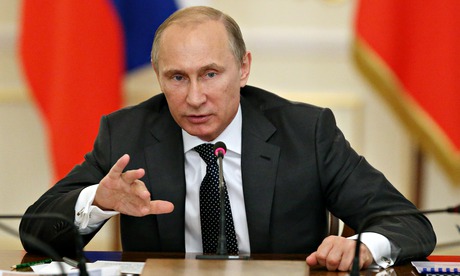Russia bans agricultural imports from west in tit-for-tat sanctions move
Kremlin decree restricts EU and American products for up to one year, while acknowledging move may lead to food price rises

Russian officials are also reported to be considering banning European airlines from flying to Asia over Siberia. Photograph: Sasha Mordovets/Getty Images
Vladimir Putin has banned the import of agricultural goods from countries that have imposed sanctions on Russia in a tit-for-tat move that deepens the economic standoff between the Kremlin and the west.
Russian government officials have been told to draw up a list of western agricultural products and raw materials that will be banned or restricted for up to one year, according to the decree published on the Kremlin website.
In tacit recognition that Russian consumers will bear the cost of the import ban, the decree also instructs officials to come up with measures to stabilize commodity markets and prevent food price rises.
The import ban follows a threat of retaliation from Russia's prime minister, Dmitry Medvedev, in response to the grounding of the budget airline subsidiary of Aeroflot as a result of EU sanctions. Russian officials are reported to be considering banning European airlines from flying to Asia over Siberia.
Food has also been caught up in political tensions between Russia and the west. In recent days Russian food safety authorities have banned the import of Polish fruit and vegetables, while McDonald's cheeseburgers and milkshakes are being investigated by a regional branch of consumer protection agency Rospotrebnadzor.
The import ban will hit all EU countries and the United States, which last week stepped up punitive action against Russia in response to Moscow's support for eastern separatists in Ukraine, unwavering despite the downing of Malaysian airliner MH17.
The Kremlin decree did not specify which foods would be affected, but an official told the newspaper Vedomosti that the list would include meat, fruit and vegetables, but not wine or baby food.
Russia is Europe's second largest market for food and drink and has been an important consumer of Polish pig meat and Dutch fruit and vegetables. Exports of food and raw materials to Russia were worth €12.2bn (£9.7bn) in 2013, following several years of double-digit growth.
The UK is less likely to lose out; in 2013 its biggest food and drink export was £17m of frozen fish, followed by £5.7m of cheese and £5.3m of coffee.
Russia banned EU pork at the start of the year as the Ukraine crisis escalated, cutting off 25% of all European pig meat exports in a move that the European Commission said exposed European farmers to significant losses.
Russia's state-owned banks have been cut off from Europe's capital markets, while Russian defense and energy firms will no longer be able to import hi-tech western equipment that could have been used for military purposes, fracking or Arctic oil exploration.
Russia has remained defiant in the face of the sanctions, which its foreign ministry has called destructive and short-sighted.
Editor: What did Pres. Obama expect? NeoCon advisors are urging Obama to interfere in Russian neighborhood. New Cold War is what NeoCons want.
No comments:
Post a Comment